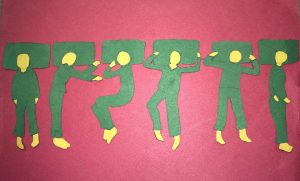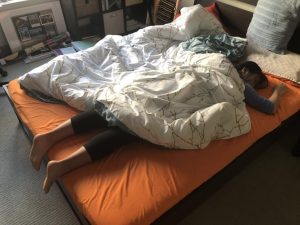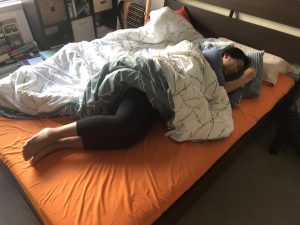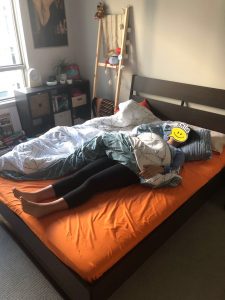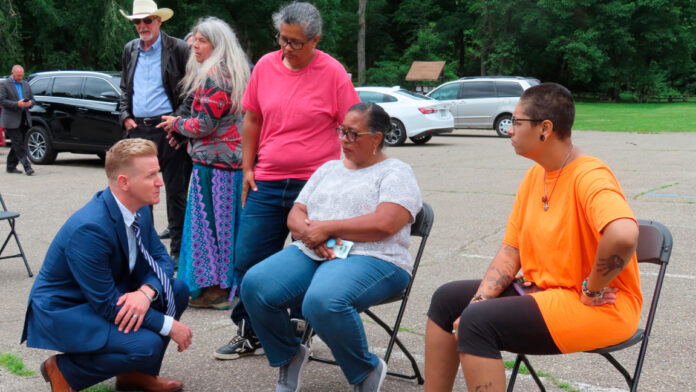When I woke up today, I found that my neck and shoulder were extremely sore. I was totally fine last night before bed and I didn’t have any strenuous exercise yesterday. I started to think that maybe sleeping position matters. Everyone has a favorite sleeping position, but what are the pros and cons of your favorite ones?
Face down is my favorite sleeping position, but it is actually this position that caused my neck and shoulder soreness. The prone position prevents the relaxing of the spine and also adds extra forces to muscles and joints. These extra forces make us feel very sore, numb or even tingly at some parts of body. The prone position is especially dangerous for babies According to a research study from Tasmania, Australia, the major contributing factor to the recent SIDS rate decline in Tasmania has been the reduction in the proportion of infants usually sleeping prone. [1] What’s more, a study about occurrence and mechanisms of sudden oxygen desaturation in infants who sleep face down had a conclusion that rebreathing in prone sleeping infants is associated with an increased frequency of episodic desaturations. Desaturation may result from respiratory pattern changes such as brief apneas often associated with evidence of behavioral arousal or failure to increase ventilation in the face of rising inspired carbon dioxide, also associated with behavioral arousal. [2]
The lateral position is also a common sleeping position of mine. In contrast to prone, lateral position is good for our spine since it ensures the extension of spine. What’s more, lateral position is also good for people who are struggling with sleep apnea. A experiment about effect of sleep position and sleep stage on the collapsibility of the upper airways in patients with sleep apnea showed that The results indicate that collapsibility of the upper airways is not mediated by sleep stages but is strongly influenced by body position. As a consequence lower nCPAP pressure is needed during lateral positions compared to supine positions. [3]
Supine position is the easiest but the most uncommon position for me. So I was surprised to find that supine position actually has advantages for preterm infants. A experiment about the effect of prone and supine position on sleep,apneas and arousal in preterm infants concludes that it is important to recommend supine sleeping after neonatal unit discharge for prematurely born infants because very prematurely born infants studied before neonatal unit discharge sleep more efficiently with fewer arousals and more central apneas in the prone position. [4]
Citation
[1]Dwyer, T., Ponsonby, A. L., Blizzard, L., Newman, N. M., & Cochrane, J. A. (1995). The contribution of changes in the prevalence of prone sleeping position to the decline in sudden infant death syndrome in Tasmania. Jama, 273(10), 783-789.
[2]Patel, Aloka L., et al. “Occurrence and mechanisms of sudden oxygen desaturation in infants who sleep face down.” Pediatrics 111.4 (2003): e328-e332.
[3]Penzel, Thomas, et al. “Effect of sleep position and sleep stage on the collapsibility of the upper airways in patients with sleep apnea.” Sleep 24.1 (2001): 90-95.
[4]Bhat, Ravindra Y., et al. “Effect of prone and supine position on sleep, apneas, and arousal in preterm infants.” Pediatrics 118.1 (2006): 101-107.
